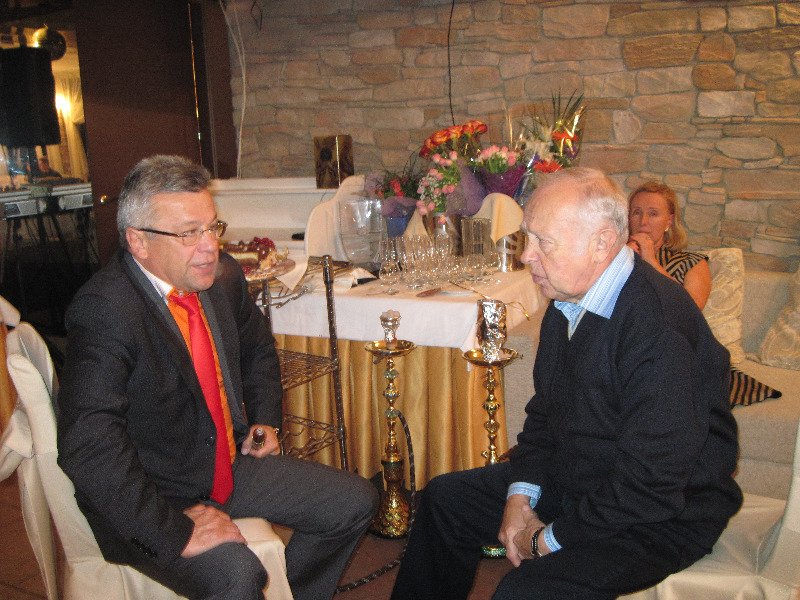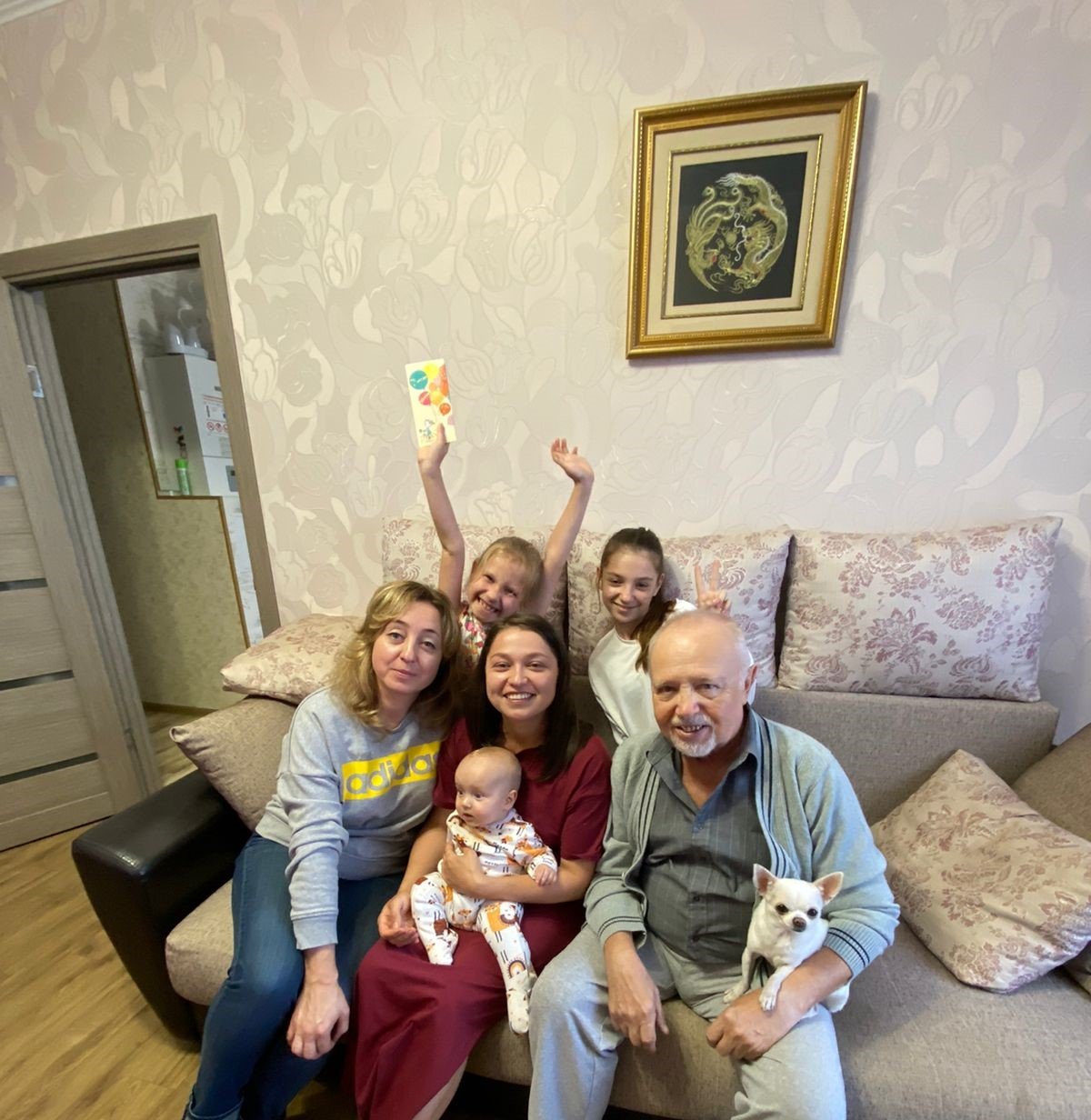IT'S SAD

THE WORLD ISN’T SO BIG AFTER ALL, IS IT?
A version of this article was published on March 16, 2023, in the Jewish Link, where I am a staff writer.
Leonid was my second cousin, but we never met. His father, Avrum, born in 1909 in Chudnov, Ukraine, was my father's first cousin. Our fathers may have "met," as babies, but my father, born in 1911, left Chudnov with his family and came to live in the United States in 1912. Avrum, and my uncle with my father, raised on opposite sides of the world, may have even played together as babies. Sadly though, they never had an opportunity to bond as a family.
According to his granddaughter Natalya, Avrum, the only one of four brothers from a family of eight children who survived military service in WWII, never spoke of his Jewish ancestry. Notably, Natalya’s father, Avrum’s son, Leonid, 82, passed away at his home in Russia on October 5, 2022, on the holiest day of the Jewish year, Yom Kippur.
Charted here, Eida was my paternal Grandfather Nathan’s older sister. Grandaunt Eida never ventured to the States. See Our Cousins, Our Heroes, dated March 22, 2022, at sharonmarkcohen.com.
siblings: Eida ——— Nathan
| | | |
first cousins: Avrum ——— Benjamin
| | | |
second cousins: Leonid ——— Sharon
| |
second cousin once removed: Natalya (third cousin to my children)
Leonid’s daughter Natalya, living on the other side of the world, and approaching age 44, is English literate. My cousin Natalya and I have become remarkably close over the past few years, communicating only through email or WhatsApp. Her first pointed question to me, Am I Jewish? was answered without reserve.
With the help of one clue I saved in my family tree files, namely that Natalya’s great-grandmother, Eida, my grandfather’s sister, died in a hospital in Leningrad, she located that ancestor’s grave, in what is now St. Petersburg. That singular clue came from a cousin from Natalya's branch of the family who immigrated to the United States in 1991 from Chudnov and settled in Maryland.
Upon one of many visits to our cousin’s home in Maryland, she told me that her mother brought her grandmother Eida from Chudnov, my father’s ancestral shtetl, to a hospital in Leningrad for the treatment of a problem with her legs, and she died there. That was in the 1930s, but she was not positive of the year.
Natalya wrote meaningfully after her father’s passing, “My uncle Yakov [Leonid’s only living brother out of three younger brothers, age 70] visited Eida's grave and put things in order there. After 90 years, Eida is visited by her grandchildren and great-grandchildren. This event still stirs thoughts and feelings.”
Having visited the graves of my husband’s great-grandparents in New York, and customarily placing stones, gives added meaning to my cousin’s sentiments. Those sites had not been visited in many, many decades, probably also 90 years, where the deceased were interred as early as 1918.
My Grandaunt Eida’s polished tombstone in Russia was cleared, and made legible, by Natalya’s uncle. Such information adds valuable information to our family tree files. I immediately sent a copy to our cousins in Chudnov, Ukraine, Israel, and Germany. All over the world, there are cousins keeping files of our ancestry.
Eida and her husband were descended from Jewish ancestry as far back as can be traced. Living in central Ukraine, not all their children took Jewish spouses around WWII. Their descendants are now seeking and embracing their sometimes-untold Jewish ancestry.
Today, cousins in Ukraine and Russia care for the graves of our Jewish ancestors. Their watch over these monuments is not only a good deed but, indeed monumental. At the time of Leonid’s demise, it was a great New Year blessing that they visited the graves of our ancestors, as is our custom around the time of the High Holidays.
Sadly, just as with our fathers, chances are Natalya and I will never meet. No matter what, we hope to continue communicating, sharing, and caring for years to come. We can take solace in our recorded family history back to 1765, with a photo history to match our records.
While we never met, we’re kindred spirits, and my cousin Natalya, living in Sochi, Russia, pleads with us to take care of ourselves:
“Sharon, I continue to admire and wonder at your articles. How did you put everything together? How much effort and time...How much of your soul is invested...And after all, you communicate with everyone, you know everything about everyone. It's such a wealth. Not everyone is given to be as rich as you. I'm glad to be a part of this story.
“Sharon, take care of yourself and your health. And let your husband be attentive to his health.”
It’s sad. After researching for so many years and finding a wonderful contingent of cousins living in Russia, we cannot meet. Well-educated, more than self-sufficient, and sporting happy family lives, my cousins are untouchable.
When Leonid died on October 5, 2022, at his home in Kingisepp, Leningrad region of Russia, at age 82, I yearned to throw my arms around his grieving daughter, Natalya.
Natalya and I have established a close relationship over the past few years. We communicate through all the modern mechanisms in social media. See my published article in the Jewish Link, Am I Jewish? archived on my website at sharonmarkcohen.com, under “articles.”
Now, Natalya’s hidden family history has been unleashed. Her paternal grandfather, Leonid’s father, Avrum, was born to two Jewish parents with a complete Jewish lineage, which I’ve documented as far back as 1765.
Everyone knows by now that I take my genealogy research seriously and have documented all sides of my children’s ancestry as far as possible in available Jewish records. With that, my mantra, that everyone deserves a legacy, is universally known. That’s precisely why I wholeheartedly agreed when Natalya asked me if she could write about her father for my blog post.
As for Leonid’s legacy, Natalya wrote: “The story about the father is in the process. I selected the photos. I will tell you about the siege of Leningrad, his injury, and many other things from his life. The sketches have already been made.”
As I was about to post this blog, I wrote to my cousin Natalya and asked again for the story. She responded, “On August 14, Leonid Kaya, the eldest grandson of Eida Murovannay and Pinhos Kaya, would have turned 84.
“Leonid was born in 1940 in Leningrad in the family of Avrum and Natalya Kaya. Avrum and his brother Moisha, who also moved to Leningrad from Chudnov in search of work and a better life, went to the front from the first days of the war.*
“When the siege of Leningrad began on September 8, 1941, Leonid was in his second year. On September 10, 1941, a bomb hit the kindergarten where little Leonid was. All the children died. Leonid was wounded in the head but survived. Despite the fact that Leonid was very small, he remembered the hunger he had to endure with his mother all his life. And all his life he treated food carefully.
“The parents raised their son in strictness and respect for their parents. After the war, Avrum worked as a driver, and his wife worked as a cleaner. Despite poverty, the parents were able to educate their son.
“Leonid was the eldest son. Besides him, two more boys were born in the family, Peter and Yakov. Leonid maintained the closest and warmest relations with his younger brother Yakov and his family until the end of his life.
“Leonid became a professional military man. He was a highly erudite man, well-versed in literature, history, and politics not only of his country but of many foreign countries. Due to the duty of his service, Leonid served in different parts of his country.
“Leonid met his wife Elena in Belarus when he was doing his military service. The family had two children, a son Alexey, and a daughter Natalya. Leonid was a wonderful husband and father. He could teach his children any science himself, and in any museum, he could conduct excursions better than any tour guide.
“Leonid's greatest passion was books. All his life he collected various authors and read a lot. He preferred paper books to e-books: the indescribable "book" smell, the pleasure of turning pages, tracking how much has been read and how much is left to the end. His personal library is huge.
“Leonid was lucky enough to raise two great-granddaughters from his eldest granddaughter Irina, Alexey's daughter. Leonid was an incredibly bright, kind person. He passed away at the age of 82 after the illness.”
The world isn’t so big after all. Is it? To learn more about this branch of my family, see my blog post From Russia With Love, at sharonmarkcohen.com, dated December 7. 2021.
May Cousin Leonid (14 August 1940 - 5 October 2022) rest in eternal peace with all our ancestors from around the world
Leonid at age 23
1967 Leonid marries Elena
1978 Leonid and Elena
Leonid Kaya - Undated
Brothers Yakov and Leonid Kaya
Three generations Max, Alex, and Leonid Kaya
Leonid and family with daughter Natalya on left
Cousin Leonid in the photo placed on the grave of his father Avrum.
Grave of Avrum’s mother, Leonid’s grandmother - my Grandaunt Eida (my grandfather’s sister)
Avrum (left, Leonid’s father), Moisha, Lova (Leib), and Yellik (Joil) - all known by various names whether Yiddish or Russian variants (See Our Cousins, Our Heroes, dated March 22, 2022, at sharonmarkcohen.com.
Only Avrum survived the war - [Moisha, aka Mikhail 10-22-2021 Cousin Alexey Portnoy found his war records. He was born in 1906 - sergeant - died in the hospital on Jan. 6, 1943. His grave: grave Nr 132 in Moskau cemetery Perovskoe Reutovskaya str. When the war began their brother Yellik (Joil), a policeman, went to the front as a volunteer (as a volunteer because the policemen remained in the rear to keep order). He died in 1944 not far from Kharkov. Lova (Leib), the youngest brother, was a military pilot who, also did not survive the war. He died flying over Finland].









